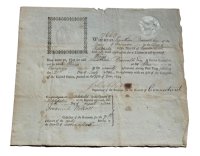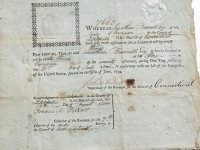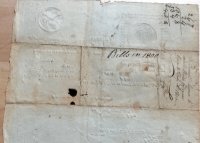MelroseBOOKS&ART
[Alcohol] Original Manuscript 1794 Canaan Ct. RETAIL WINE LICENSE Signed Wolcott & Chester
$175
Item Details
USA, 1794, Disbound
1st, VG
[Alcohol] Original Manuscript 1794 Canaan Ct. RETAIL WINE LICENSE Signed Wolcott & Chester
John CHESTER (1749-1809), Frederick WOLCOTT (1767-1837). Letterpress and manuscript license to retail wines granted to Jonathan Burrell of Canaan, Ct., 13th August 1800, signed by Chester and Wolcott, docketed on the verso (7 x 8 ¼ inches). (Old folds).
John Chester (1749-1809) was a militia officer and public official from Connecticut. Before the American Revolution, he was a militia officer and member of the Connecticut General Assembly. During the American Revolutionary War, he saw action from the Battle of Bunker Hill to the Battle of Trenton as part of Connecticut's troops, but he did not join the Continental Army, and left military service after 1776. He served as Speaker of the Connecticut House of Representatives, among other public offices, and was an original member of the Society of the Cincinnati. [1] He was a judge of the Connecticut Supreme Court of Errors from 1788 to 1792 and from 1803 to 1807[2] His grandson Samuel Chester Reid served in the United States Navy during the War of 1812.
Frederick Wolcott (1767-1837) was the son of Governor Oliver and Lorana (Collins) Wolcott. His father was Governor of Connecticut and a signer of the Declaration of Independence. Frederick Wolcott was the younger of two surviving sons. In 1786, Frederick graduated from Yale. The following year he got his law degree from the Litchfield Law School. Illness, however, prevented him from practicing law right out of school. Instead of pursuing his own law practice, Frederick was Clerk of the Common Pleas. He followed that job by moving up in 1798 to become the Clerk of the Superior Court in Litchfield County.
Afterwards he was appointed a Judge of Probate, a position he held until he retired from public life. In June of 1805, Oliver Wolcott, Benjamin Tallmadge, and Frederick Wolcott signed an agreement to finance four successive voyages to China, beginning in the spring of 1806. Shares in the venture were later purchased by local merchant Julius Deming. Oliver Wolcott procured the Trident, a nearly new vessel, to carry out the trade. Goods they imported were also sold in Litchfield, as well as by Belden, Dwight, & Company of New Haven. The Embargo Act of 1807, which remained in effect until 1809, raised concerns about foreign trade which pervaded the endeavor. In April of 1809, Oliver Wolcott announced to his brother, "...we have concluded to send out the Trident with a moderate Investment & to close the existing concern with the depending voyage." Frederick did a lot of his business with his brother, Oliver Jr. They owned the Wolcottville Manufacturing Company which manufactured woolen cloth, and they imported sheep and cattle. Throughout his life he held several other positions: he represented Litchfield in the Connecticut General Assembly, was president of the Litchfield County Foreign Mission and Education Societies, was president of the Board of Trustees of the Litchfield Female Academy, was a fellow of the Connecticut Academy of Arts and Sciences, and was a fellow of Yale College. Wolcott married twice. He and his first wife had four daughters and two sons. Two of those daughters married Litchfield Law School graduates. Wolcott and his second wife had two daughters. He died in Litchfield, CT at the age of sixty-nine.
MelroseBOOKS&ART
LISA BOUCHARD
116 GOVERNOR STREET
PROVIDENCE, RI, 02906
United States
Phone: 7814857626
Cell: 7814857626
Visit Website
Specialities
Photographica,Popular Culture, Archives

More Information
Booth 26
Shipping and Returns
Thank you for your patronage!We ship all items via USPS Priority Mail, within 48 hours of payment.
We DO NOT ACCEPT RETURNS unless item(s) is substantially different from description.
We accept Paypal ([email protected]), checks, money orders.
Open Times
No open shopAdditional Information
We extend a 20% professional discount to all resellersPlease feel free to make (reasonable) offers on individual/lotted items
![[Alcohol] Original Manuscript 1794 Canaan Ct. RETAIL WINE LICENSE Signed Wolcott & Chester](https://bookandpaperfairsonline.us-east-1.linodeobjects.com/thumbs/1752601958wolcott1.jpeg)


